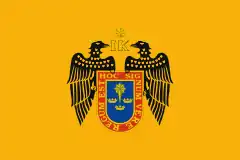| Paseo de los Héroes Navales | |
|---|---|
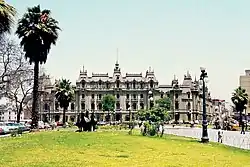 The park (foreground) and the Edificio Rímac (background), photographed in 1980 | |
| Type | Public park |
| Location | Historic Centre of Lima |
| Created | 1920s |
| Operated by | Municipality of Lima |
| Open | 24 hours |
The Promenade of the Naval Heroes (Spanish: Paseo de los Héroes Navales) is a public park located in the historic centre of Lima. It occupies the first block of the Paseo de la República. It was given its current name on October 8, 1979 in commemoration of the centenary of the battle of Angamos.
History
The square was built in the 1920s during the government of President Augusto B. Leguía and since then it has been the scene of some of the largest social demonstrations in the country. Starting in the 1990s, political rallies leading up to elections have been held on the Paseo. The square along with the first meters of the Paseo de la República expressway has also been used for the organization of automobile events.[1]
In June 2007, work began for the construction of the Central Underground Station that articulates the authorized lines that provide public transport service on the express roads of Paseo de la República and Grau Avenue within the Metropolitan transport system that connects the districts of Comas and Chorrillos.[2] The project, which serves one hundred and ten thousand passengers daily, also contemplated the construction of a shopping center and connection exits with España and Lampa avenues, as well as the reconstruction, on the surface, of the Paseo de los Héroes Navales.[3] In 2008 the construction of the tunnels that replace the mixed pedestrian zone was carried out.[4]
Surroundings
The park forms one of the largest and busiest public spaces in the city, and is surrounded by important buildings on all sides. Among them are:
Sculptures
On April 24, 2018, the sculptures of Paseo Colón were part of the ninety-one sculptures declared Cultural Heritage of the Nation by the Ministry of Culture:[5][6] On February 4, 2022, after recovery work on the promenade, the ten new busts were unveiled in a ceremony presided over by the mayor of Lima Jorge Muñoz Wells and the general commander of the Peruvian Navy, Alberto Alcalá Luna.[7]
| Name | Author | Date | Material | Proportions | Image |
|---|---|---|---|---|---|
| Bust of Fermín Diez Canseco Coloma | 1979 | ||||
| Bust of Carlos de los Heros | 1979 | ||||
| Bust of Pedro Garezon | 1979 | ||||
| Bust of Elías Aguirre | 1979 | ||||
| Bust of Enrique Palacios | 1979 | ||||
| Bust of Diego Ferré | 1979 | ||||
| Bust of Gervasio Santillana | 1979 | ||||
| Bust of José Rodríguez | 1979 | ||||
| Bust of Melitón Carvajal | 2022 | ||||
| Bust of Manuel Villavicencio | 2022 | ||||
| Bust of Aurelio García y García | 2022 | ||||
| Bust of Lizardo Montero | 2022 | ||||
| Bust of Emilio San Martín | 2022 | ||||
| Bust of Juan Fanning | 2022 | ||||
| Bust of Luis Germán Astete | 2022 | ||||
| Bust of Decio Oyague | 2022 | ||||
| Bust of Jorge Velarde | 2022 | ||||
| Bust of Nicolás Dueñas | 2022 | ||||
| Las llamas | Agustín Rivera Eyzaguirre | 1935 | Bronze | 1.80 m. × 1.70 m. × 3.30 m. | 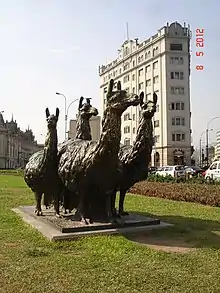 noframe |
| La yunta | Ismael Pozo Velit | 1937 | Bronze | 2.20 m. × 1.75 m. × 3.00 m. |  |
See also
References
- ↑ "Los mejores karts estarán en la ciudad". Perú Autos. Archived from the original on 2007-09-10.
- ↑ "Alcalde de Lima dio inicio a trabajos de súper moderna estación central subterranea". PressPeru. 2007. Archived from the original on 2007-09-29.
- ↑ "Estación Central de Paseo de los Héroes Navales atenderá a 110 mil pasajeros diarios". Andina. 2007-07-16. Archived from the original on 2007-09-27.
- ↑ "Inician construcción de túneles de Estación Central Subterránea de Lima". RPP Noticias. 2008-08-04. Archived from the original on 2008-08-06.
- ↑ "Resolución Viceministerial N° 053-2018-VMPCIC-MC". Ministry of Culture. 2018-04-24.
- ↑ Bedoya Ramos, Daniel (2019-08-01). "La agonía del Paseo de los Héroes Navales: patrimonio sufre deterioro de monumentos". El Comercio.
- ↑ "Presentan el Paseo de los Héroes Navales totalmente recuperado". Marina de Guerra del Perú. 2022-02-04.
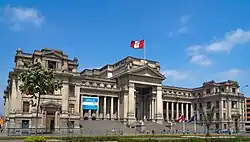

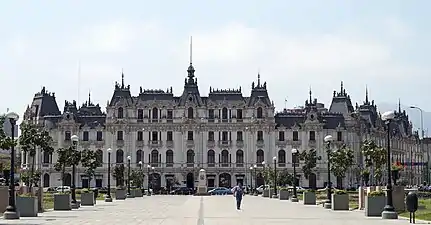


.jpg.webp)
